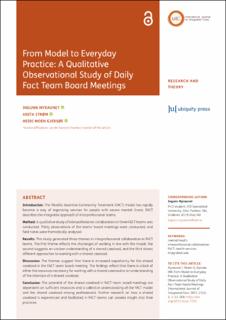| dc.contributor.author | Myraunet, Ingunn | |
| dc.contributor.author | Strøm, Anita | |
| dc.contributor.author | Gjersøe, Heidi Moen | |
| dc.date.accessioned | 2023-10-17T13:08:38Z | |
| dc.date.available | 2023-10-17T13:08:38Z | |
| dc.date.created | 2023-10-16T12:24:19Z | |
| dc.date.issued | 2023 | |
| dc.identifier.citation | International Journal of Integrated Care (IJIC). 2023, 23 (4), 1–11 | en_US |
| dc.identifier.issn | 1568-4156 | |
| dc.identifier.uri | https://hdl.handle.net/11250/3097043 | |
| dc.description | This is an open-access article distributed under the terms of the Creative Commons Attribution 4.0 International License (CC-BY 4.0), which permits unrestricted use, distribution, and reproduction in any medium, provided the original author and source are credited. See http://creativecommons.org/licenses/by/4.0/. | en_US |
| dc.description.abstract | Introduction: The Flexible Assertive Community Treatment (FACT) model has rapidly become a way of organising services for people with severe mental illness. FACT describes the integrated approach of interprofessional teams.
Method: A qualitative study of interprofessional collaboration in three FACT teams was conducted. Thirty observations of the teams’ board meetings were conducted, and field notes were thematically analysed.
Results: This study generated three themes in interprofessional collaboration in FACT teams. The first theme reflects the challenges of working in line with the model, the second suggests an unclear understanding of a shared caseload, and the third shows different approaches to working with a shared caseload.
Discussion: The themes suggest that there is increased opportunity for the shared caseload in the FACT team board meeting. The findings reflect that there is a lack of either the resources necessary for working with a shared caseload or an understanding of the intention of a shared caseload.
Conclusion: The potential of the shared caseload in FACT team board meetings are dependent on sufficient resources and a collective understanding of the FACT model and the shared caseload among professionals. Further research on how a shared caseload is experienced and facilitated in FACT teams can provide insight into their practices. | en_US |
| dc.language.iso | eng | en_US |
| dc.publisher | Ubiquity Press | en_US |
| dc.rights | Navngivelse 4.0 Internasjonal | * |
| dc.rights.uri | http://creativecommons.org/licenses/by/4.0/deed.no | * |
| dc.subject | Tverrfaglig samarbeid | en_US |
| dc.subject | Collaboration across the curriculum | en_US |
| dc.subject | Psykisk helse | en_US |
| dc.subject | Psykisk helse | en_US |
| dc.subject | integrated care | en_US |
| dc.subject | health services | en_US |
| dc.subject | FACT | en_US |
| dc.subject | interprofessional collaboration | en_US |
| dc.subject | mental health | en_US |
| dc.title | From model to everyday practice: A qualitative observational study of daily fact team board meetings | en_US |
| dc.type | Peer reviewed | en_US |
| dc.type | Journal article | en_US |
| dc.description.version | publishedVersion | en_US |
| dc.rights.holder | © 2023 The Author(s). | en_US |
| dc.subject.nsi | VDP::Helsefag: 800 | en_US |
| dc.subject.nsi | VDP::Health sciences: 800 | en_US |
| dc.source.pagenumber | 1-11 | en_US |
| dc.source.volume | 23 | en_US |
| dc.source.journal | International Journal of Integrated Care (IJIC) | en_US |
| dc.source.issue | 4 | en_US |
| dc.identifier.doi | 10.5334/ijic.7555 | |
| dc.identifier.cristin | 2185103 | |
| cristin.ispublished | true | |
| cristin.fulltext | original | |
| cristin.qualitycode | 1 | |

